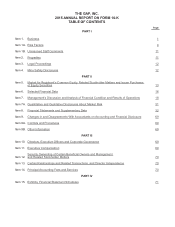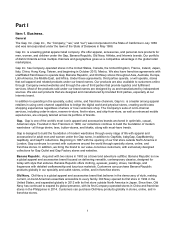Banana Republic 2015 Annual Report Download - page 17
Download and view the complete annual report
Please find page 17 of the 2015 Banana Republic annual report below. You can navigate through the pages in the report by either clicking on the pages listed below, or by using the keyword search tool below to find specific information within the annual report.8
financial performance. For example, the work slowdowns and stoppages at U.S. West Coast ports at the end of
fiscal 2014 and beginning of fiscal 2015 created product delivery delays that impacted our ability to effectively
manage our inventory and deliver seasonally correct product in a timely manner, which impacted our financial
results for fiscal 2015. Manufacturing delays, transportation delays, or unexpected demand for our products may
require us to use faster, but more expensive, transportation methods such as aircraft, which could adversely affect
our gross margins. In addition, the cost of fuel is a significant component in transportation costs, so increases in
the price of petroleum products can adversely affect our gross margins.
Risks associated with importing merchandise from foreign countries, including failure of our vendors to
adhere to our Code of Vendor Conduct, could harm our business.
We purchase nearly all merchandise from third-party vendors in many different countries and we require those
vendors to adhere to a Code of Vendor Conduct, which includes environmental, labor, health, and safety
standards. From time to time, contractors or their subcontractors may not be in compliance with these standards
or applicable local laws. Although we have implemented policies and procedures to facilitate our compliance with
laws and regulations relating to doing business in foreign markets and importing merchandise into various
countries, there can be no assurance that suppliers and other third parties with whom we do business will not
violate such laws and regulations or our policies. Significant or continuing noncompliance with such standards
and laws by one or more vendors could have a negative impact on our reputation, could subject us to liability, and
could have an adverse effect on our results of operations.
Trade matters may disrupt our supply chain.
Trade restrictions, including increased tariffs or quotas, embargoes, safeguards, and customs restrictions against
apparel items, as well as U.S. or foreign labor strikes, work stoppages, or boycotts, could increase the cost or
reduce the supply of apparel available to us and adversely affect our business, financial condition, and results of
operations. We cannot predict whether any of the countries in which our merchandise currently is manufactured or
may be manufactured in the future will be subject to additional trade restrictions imposed by the United States or
other foreign governments, including the likelihood, type, or effect of any such restrictions. In addition, we face the
possibility of anti-dumping or countervailing duties lawsuits from U.S. domestic producers. We are unable to
determine the impact of the changes to the quota system or the impact that potential tariff lawsuits could have on
our global sourcing operations. Our sourcing operations may be adversely affected by trade limits or political and
financial instability, resulting in the disruption of trade from exporting countries, significant fluctuation in the value
of the U.S. dollar against foreign currencies, restrictions on the transfer of funds, and/or other trade disruptions.
Our franchise business is subject to certain risks not directly within our control that could impair the
value of our brands.
We enter into franchise agreements with unaffiliated franchisees to operate stores and, in limited circumstances,
websites, in many countries around the world. Under these agreements, third parties operate, or will operate,
stores and websites that sell apparel and related products under our brand names. The effect of these
arrangements on our business and results of operations is uncertain and will depend upon various factors,
including the demand for our products in new markets internationally and our ability to successfully identify
appropriate third parties to act as franchisees, distributors, or in a similar capacity. In addition, certain aspects of
these arrangements are not directly within our control, such as franchisee financial stability and the ability of these
third parties to meet their projections regarding store locations, store openings, and sales. Other risks that may
affect these third parties include general economic conditions in specific countries or markets, foreign exchange
rates, changes in diplomatic and trade relationships, restrictions on the transfer of funds, and political instability.
Moreover, while the agreements we have entered into and plan to enter into in the future provide us with certain
termination rights, the value of our brands could be impaired to the extent that these third parties do not operate
their stores in a manner consistent with our requirements regarding our brand identities and customer experience
standards. Failure to protect the value of our brands, or any other harmful acts or omissions by a franchisee,
could have an adverse effect on our results of operations and our reputation.
























